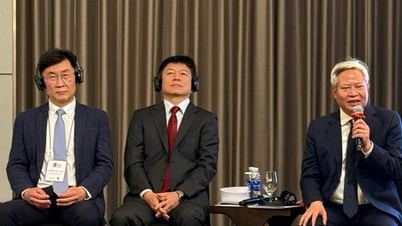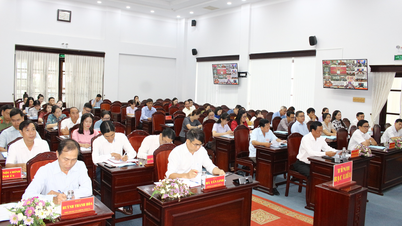 |
| Civil servants working at the one-stop department, Da Nang City Administrative Center, March 2025. Photo: Nguyen Dong |
The Ministry of Home Affairs is drafting a revised Law on Cadres and Civil Servants, which stipulates four levels of civil servant classification, including: excellent performance; good performance; performance; and failure to perform.
A notable point is the handling process for civil servants classified as "not completing their tasks". Specifically, civil servants in this category will be monitored by the management agency for 6 months. If after this period, the civil servant still does not improve and meet the requirements of the job position, they will be considered for assignment to a job with a lower rank. In case there is no suitable position at a lower rank, the civil servant may be dismissed.
This is different from the current regulations, in which civil servants must be assessed as failing to complete their tasks for two consecutive years before they are considered for dismissal. For managers, if they fail to complete their tasks for two consecutive years, they will be transferred to another position or not be reappointed to their old position. As for non-leaders, if within three years there are two non-consecutive years in which they are assessed as failing to complete their tasks, they will be transferred to another job with lower requirements.
The drafting agency explained that this new proposal demonstrates a higher determination in screening and improving the quality of civil servants, ensuring the professionalism and efficiency of the state apparatus.
The draft revised Law on Cadres and Civil Servants proposes a new method of evaluating civil servants, focusing more on actual work performance. Instead of general criteria on capacity and qualifications, the revised law requires evaluation based on specific results and products that civil servants create, compared with the requirements of the job position and the level of meeting those requirements.
This assessment result will become an important basis for all decisions related to civil servants, from arrangement, use, appointment, training, reward, discipline to screening and implementation of appropriate remuneration policies for each position.
Evaluation time is also more flexible. In addition to annual evaluations or before important events such as appointments and transfers, the draft allows units to evaluate quarterly, monthly or weekly, depending on the specific nature of the work.
The assessment content has been expanded to include: compliance with policies, moral qualities, service attitude, capacity and responsibility to meet job requirements, along with results of specific tasks. For managers, there are also additional criteria on the agency's performance, solidarity capacity and spirit of innovation, and daring to take responsibility.
The draft revised Law on Civil Servants and Public Employees is expected to be submitted to the National Assembly at its 9th session opening in early May.
Source: https://baothainguyen.vn/xa-hoi/202504/cong-chuc-khong-hoan-thanh-nhiem-vu-co-the-bi-thoi-viec-sau-6-thang-d5f2816/
























![[Photo] Prime Minister Pham Minh Chinh works with the Standing Committee of Thai Binh Provincial Party Committee](https://vphoto.vietnam.vn/thumb/1200x675/vietnam/resource/IMAGE/2025/5/12/f514ab990c544e05a446f77bba59c7d1)

![[Photo] Prime Minister Pham Minh Chinh receives Swedish Minister of International Development Cooperation and Foreign Trade](https://vphoto.vietnam.vn/thumb/1200x675/vietnam/resource/IMAGE/2025/5/12/ae50d0bb57584fd1bbe1cd77d9ad6d97)



































































Comment (0)